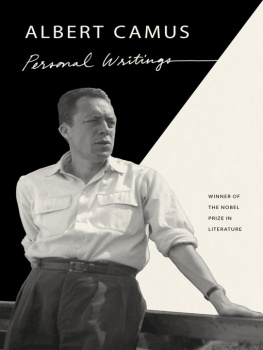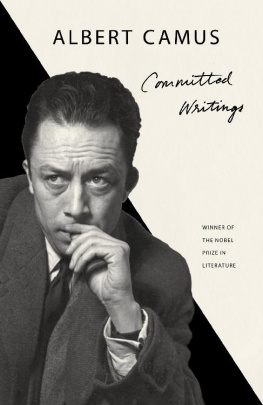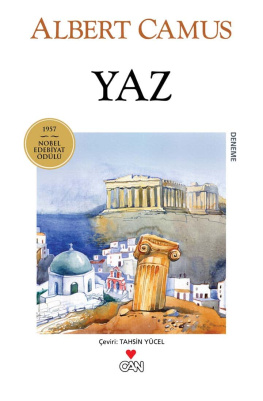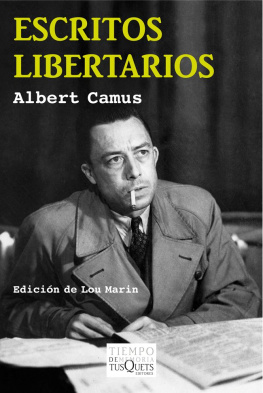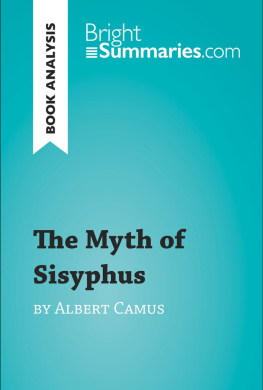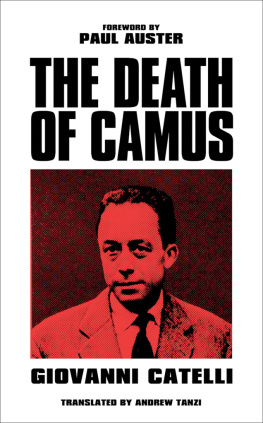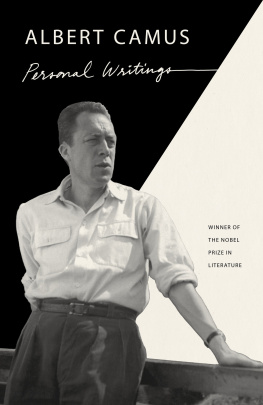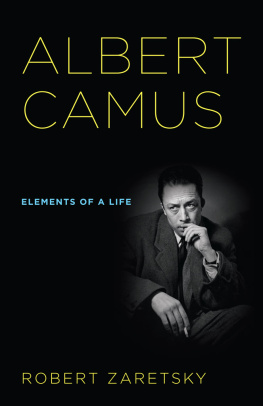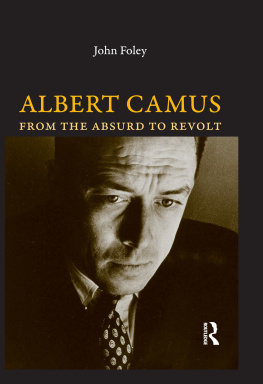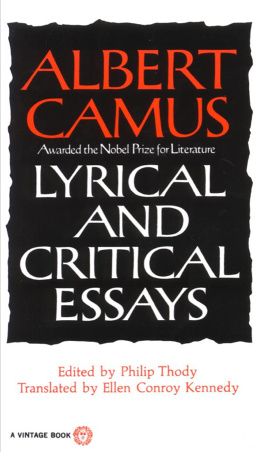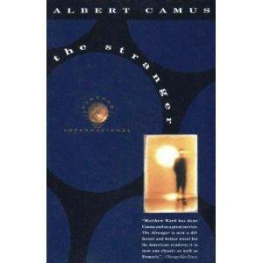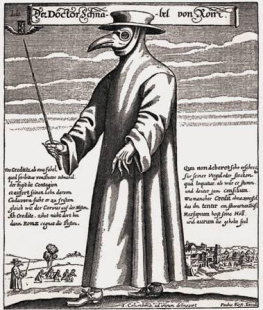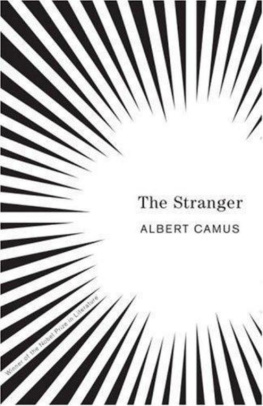Camus - Personal Writings
Here you can read online Camus - Personal Writings full text of the book (entire story) in english for free. Download pdf and epub, get meaning, cover and reviews about this ebook. year: 2020, publisher: Vintage, genre: Non-fiction. Description of the work, (preface) as well as reviews are available. Best literature library LitArk.com created for fans of good reading and offers a wide selection of genres:
Romance novel
Science fiction
Adventure
Detective
Science
History
Home and family
Prose
Art
Politics
Computer
Non-fiction
Religion
Business
Children
Humor
Choose a favorite category and find really read worthwhile books. Enjoy immersion in the world of imagination, feel the emotions of the characters or learn something new for yourself, make an fascinating discovery.
- Book:Personal Writings
- Author:
- Publisher:Vintage
- Genre:
- Year:2020
- Rating:5 / 5
- Favourites:Add to favourites
- Your mark:
- 100
- 1
- 2
- 3
- 4
- 5
Personal Writings: summary, description and annotation
We offer to read an annotation, description, summary or preface (depends on what the author of the book "Personal Writings" wrote himself). If you haven't found the necessary information about the book — write in the comments, we will try to find it.
Personal Writings — read online for free the complete book (whole text) full work
Below is the text of the book, divided by pages. System saving the place of the last page read, allows you to conveniently read the book "Personal Writings" online for free, without having to search again every time where you left off. Put a bookmark, and you can go to the page where you finished reading at any time.
Font size:
Interval:
Bookmark:
Personal Writings
Albert Camus was born in Algeria in 1913. He spent the early years of his life in North Africa, where he became a journalist. During the Nazi occupation of France, his essential contributions to the underground newspaper Combat and the publication of The Stranger and The Myth of Sisyphus established him as a beacon of the Resistance in postwar intellectual life. His fiction, including The Stranger, The Plague, The Fall, and Exile and the Kingdom; his philosophical essays, The Myth of Sisyphus and The Rebel; and his plays have assured his preeminent position in modern letters. In 1957, Camus was awarded the Nobel Prize in Literature. On January 4, 1960, he was killed in a car accident.

The Stranger
The Myth of Sisyphus
Caligula and Three Other Plays
The Plague
The Rebel
The Fall
Exile and the Kingdom
The First Man
Create Dangerously
Committed Writings


Copyright 1968 by Alfred A. Knopf, Inc.
Copyright 1967 by Hamish Hamilton, Ltd., and Alfred A. Knopf, Inc.
Foreword copyright 2020 by Alice Kaplan
All rights reserved. Published in the United States by Vintage Books, a division of Penguin Random House LLC, New York, and distributed in Canada by Penguin Random House Canada Limited, Toronto. Originally published in the United States by Alfred A. Knopf, a division of Penguin Random House LLC, New York, in 1968.
The Wrong Side and the Right Side was originally published in French as LEnvers et lEndroit by Editions Edmond Charlot, Algiers, in 1937. Copyright 1937. Reprinted by Editions Gallimard in 1958. Copyright 1958.
Nuptials was originally published in French as Noces by Editions Edmond Charlot, Algiers, in 1939. Copyright 1939. Reprinted by Editions Gallimard in 1950. Copyright 1950. Summer in Algiers from Noces was published in English in The Myth of Sisyphus and Other Essays, copyright 1955 by Alfred A. Knopf, a division of Penguin Random House LLC, New York. Translated by Justin OBrien.
The Minotaur, or Stopping in Oran was first published in 1950 by Editions Edmond Charlot and later included in Summer, published in French as Let by Editions Gallimard in 1954. Copyright 1954. The Minotaur, Helens Exile, and Return to Tipasa were published in English in The Myth of Sisyphus and Other Essays, copyright 1955 by Alfred A. Knopf, a division of Penguin Random House LLC, New York. Translated by Justin OBrien.
These essays were published in Great Britain in 1967 by Hamish Hamilton, Ltd., in a translation by Philip Thody, under the title Lyrical and Critical and in the United States in 1968 by Alfred A. Knopf, in a translation by Ellen Conroy Kennedy, under the title Lyrical and Critical Essays.
Vintage and colophon are registered trademarks of Penguin Random House LLC.
Library of Congress Cataloging-in-Publication Data
Names: Camus, Albert, 19131960, author. | Kaplan, Alice Yaeger, other. | Kennedy, Ellen Conroy, translator.
Title: Personal writings / Albert Camus ; translated from the French by Ellen Conroy Kennedy ; with a foreword by Alice Kaplan.
Description: A Vintage International original. | New York : Vintage International, Vintage Books, a Division of Random House LLC, 2020.
Identifiers: LCCN 2020010242 (print) | LCCN 2020010243 (ebook) | ISBN 9780525567219 (paperback) | ISBN 9780525567226 (ebook)
Classification: LCC B2430.C352 E5 2020 (print) | LCC B2430.C352 (ebook) | DDC 194dc23
LC record available at https://lccn.loc.gov/2020010242
Vintage International Trade Paperback ISBN: 978-0-525-56721-9
eBook ISBN: 978-0-525-56722-6
www.vintagebooks.com
Foreword by Alice Kaplan
The Wrong Side and the Right Side (LEnvers et lEndroit), 1937
Preface, 1958
Irony
Between Yes and No
Death in the Soul
Love of Life
The Wrong Side and the Right Side
Nuptials (Noces), 1939
Nuptials at Tipasa
The Wind at Djemila
Summer in Algiers
The Desert
Summer (LEt), 1954
The Minotaur, or Stopping in Oran
The Almond Trees
Prometheus in the Underworld
A Short Guide toTowns Without a Past
Helens Exile
The Enigma
Return to Tipasa
The Sea Close By
Alice Kaplan
Albert Camus is one of the few French writers of the last century to have emerged from genuine hardship. Born to a deaf, illiterate mother and a father killed in the Battle of the Marne when Camus was eleven months old, he was raised in a barren apartment in Belcourt, a working-class neighborhood of Algiers. The Wrong Side and the Right Side,Nuptials, and Summer, gathered here in a newly organized collection titled Personal Writings, speak from his emotional core about these beginnings and provide the foundation for all his work to come. For Americans who know Camus only through the hard-boiled prose of The Stranger, the lush emotional intensity of these early essays and stories will come as a surprise.
It is exciting, too, to discover here, in poetic form, the underpinnings of Camuss philosophical thought. In The Wrong Side and the Right Side, he gleans the whole absurd simplicity of the world as he sits with his silent, indifferent mother, incapable of understanding her. Here is the germ of the absurd condition he defines in The Myth of Sisyphus: the idea that the world will always dash our attempts to make meaning. Camus will argue in his later works that to be lucid in the face of death yet tend to the fate of the living, or, like Sisyphus, to push a rock up a hill only to see it fall back down and begin again with a sense of joy at the impossible task, is a form of revolt against our condition. In The Enigma (Summer) he writes, Where is the absurdity of the world?... I should like, faced with the white and black clarity that, for me, has always been the sign of truth, to explain in simple terms what I feel about this absurdity which I know too well to allow anyone to hold forth on it without making certain nuances. By now he has grown impatient with his reputation as a bard of the absurd. But in his earliest essays, The Wrong Side and the Right Side and Nuptials, he is still dancing around meaning, ready to embrace what he hasnt yet put into words. And especially in the essays where he explores the physical universe, we can sense the beginnings of his commitment to measure or equilibrium, to the truth that comes from the confrontation of black and white. He argues through image and metaphor and produces something like a maxim for a philosophy in the making when he writes in Return to Tipasa: In the depths of winter, I finally learned that within me there lay an invincible summer. Later, in his essay The Rebel, Camus will call this measured vision of the world thought at the Meridian.
Font size:
Interval:
Bookmark:
Similar books «Personal Writings»
Look at similar books to Personal Writings. We have selected literature similar in name and meaning in the hope of providing readers with more options to find new, interesting, not yet read works.
Discussion, reviews of the book Personal Writings and just readers' own opinions. Leave your comments, write what you think about the work, its meaning or the main characters. Specify what exactly you liked and what you didn't like, and why you think so.

